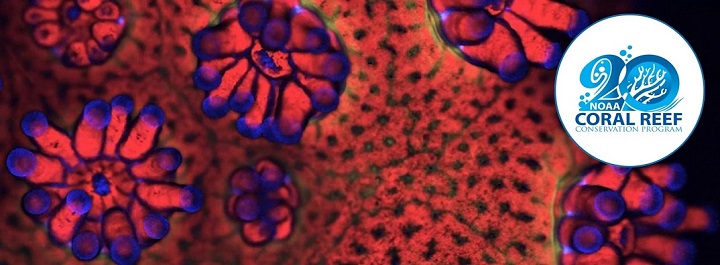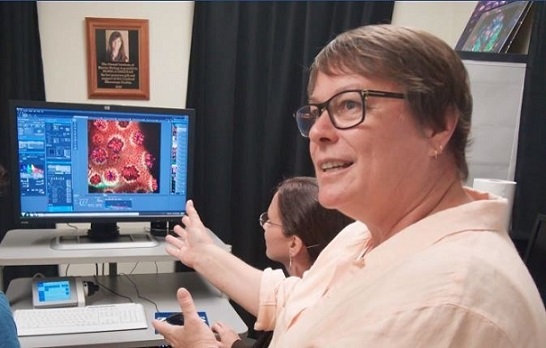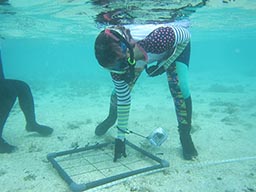- ABOUT US
- PROGRAM AREAS
- CONSERVATION APPROACH
- EDUCATION
- MULTIMEDIA
Coral Heroes: Dr. Ruth Gates
Throughout the Coral Reef Conservation Program’s 20th Anniversary, we are highlighting Coral Heroes — individuals and organizations that have worked with the program and are making a real difference in coral reef conservation.

Coral reef restoration has progressed immensely since NOAA’s Coral Reef Conservation Program was established 20 years ago. While restoration used to be viewed as individual activities that rebuild reefs damaged by boats and storms, it is now understood to be the best long-term defense against environmental stressors like ocean acidification and climate change. Sadly, the coral reef community recently lost a true leader in the fight to preserve coral ecosystems.
Dr. Ruth Gates passed away in 2018 while serving as director of the Hawaii Institute of Marine Biology. She held a bachelor’s degree and a doctorate in marine biology from Newcastle University. Among her accomplishments, Gates completed pioneering work in Jamaica that connected coral bleaching and increasing water temperatures, and determined that there is genetic diversity in zooxanthellae, or the algae that live in many coral species. More recently, she appeared in the award-winning documentary “Chasing Coral.” At the time of her passing, Gates was focused on the development of what she called “super corals”—corals that were genetically designed to resist bleaching and other environmental threats.
“Ruth was among the first scientists to establish innovative research to increase resilience in coral reefs,” notes Kira Hughes, the Ruth Gates Laboratory’s program manager at the Hawaii Institute. “Although controversial at the time, she embraced the challenge and made it her mission to bring awareness to the urgent need for coral interventions.”

Yet those who knew her would first note her optimism about the future of coral reefs and her undeniable enthusiasm for life. Many recall her infectious laugh and her obvious passion for her work.
“She often said to people, ‘You can achieve anything you want. It takes passion, grit, and perseverance,’” says Robin Burton, Gates’ wife. “She had many quotes, but I like this because she inspired everyone she came in contact with.”
In recognition of Gates and her dedication to coral restoration, NOAA recently opened a grant competition in her honor. The Ruth Gates Coral Restoration Innovation Grants competition will fund projects that aim to promote the long-term survival of restored corals by advancing resilience to environmental stressors and improving field population enhancement.
"An investment in coral reef ecosystems is an investment in our natural resources, our economy, and ultimately our future," says Jennifer Koss, director of NOAA's Coral Reef Conservation Program. "We are proud to honor the role Ruth played in the coral conservation community by creating a fund for the next generation of innovative research and development to support successful coral restoration."
We look forward to continuing the legacy of Dr. Ruth Gates and to maintaining our commitment to coral reef restoration.
Follow the celebration on our Facebook and Twitter pages and the National Ocean Service Instagram page all year using the hashtag #NOAACoral20th.
Related Stories and Products
About Us

The NOAA Coral Reef Conservation Program was established in 2000 by the Coral Reef Conservation Act. Headquartered in Silver Spring, Maryland, the program is part of NOAA's Office for Coastal Management.

The Coral Reef Information System (CoRIS) is the program's information portal that provides access to NOAA coral reef data and products.
Work With US
U.S. Coral Reef Task Force
Funding Opportunities
Employment
Fellowship Program
Contracting Assistance
Graphic Identifier
Featured Stories Archive

Access the archive of featured stories here...
Feedback
Thank you for visiting NOAA’s Coral Reef Conservation Program online. Please take our website satisfaction survey. We welcome your ideas, comments, and feedback. Questions? Email coralreef@noaa.gov.
Stay Connected
Contact Us
NOAA’s Coral Reef Conservation Program
SSMC4, 10th Floor
1305 East West Highway
Silver Spring, MD 20910
coralreef@noaa.gov
